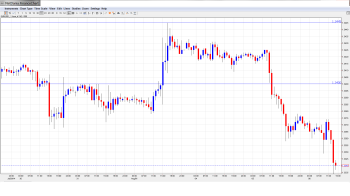EUR/USD continues to lose ground on Wednesday. The struggling euro finds itself at nine-month lows, as it trades in the mid-1.33 range. German data disappointed, as Factory Orders plunged 3.2%. Italian numbers were a mix, as GDP declined 0.2%, while Industrial Production posted a strong gain of 0.9%. In the US, Wednesday’s key event is Trade Balance. The markets are not expecting much change in the July reading.
Here is a quick update on what’s moving the pair.
- EUR/USD was steady in Asian trade but has weakened in the European session.
- Current range: 1.3325 to 1.3400.
Further levels in both directions:
- Below: 1.3325, 1.3295 and 1.32.
- Above: 1.34, 1.3450, 1.35, 1.3550, 1.3585, 1.3610, 1.3650 and 1.3677.
- 1.3325 is an immediate support line. Will the pair break below this barrier? 1.3295 is next.
- 1.34 has switched to resistance as the euro continues to lose ground.
EUR/USD Fundamentals
- 6:00 Eurozone German Factory Orders. Estimate +0.5%, actual -3.2%.
- 8:00 Italian Industrial Production. Estimate +0.9%, actual +0.9%.
- 8:10 Eurozone Retail PMI. Actual 47.6 points.
- 9:00 Eurozone Italian Preliminary GDP. Estimate +0.1%, actual -0.2%.
- 12:30 US Trade Balance. Estimate -44.2B.
- 14:30 US Crude Oil Inventories. Estimate -1.1M.
*All times are GMT.
For more events and lines, see the Euro to dollar forecast.
EUR/USD Sentiment
- US Services PMI jumps: On Tuesday, ISM Non-manufacturing PMI looked sharp, rising to 58.7 points last month. This easily beat the estimate of 56.6, and was the index’s best showing since February 2011. This follows a strong Manufacturing PMI reading last week, with the index climbing to 57.1 points, a three-year high. There was more positive news on Tuesday, as Factory Orders had an impressive July, gaining 1.1%. These solid numbers point to healthy expansion in the US manufacturing and services sectors, helping the US dollar post inroads against the euro.
- German Factory Orders plunges: German manufacturing data was terrible on Wednesday, as Factory Orders fell by 3.2%. This was the strongest decline since October 2012. Despite concern about the health of the German economy, the euro-zone locomotive enjoys a strong job market that already triggers calls for wage hikes, even from the Bundesbank. Such a rise would push euro-zone core inflation higher.
- Fear returns: While the situation in Portugal’s BES was quickly contained and poses no systemic risk, it goes to show that things can pop out of the blue and get out of control very quickly. This casts a doubt on how much the ECB’s stress tests can be reliable and prevent a crash.
- Low inflation puts pressure on the ECB: Inflation in the euro-zone scratches the bottom, with 0.4% y/y in July. Core inflation is at 0.8%. Despite a weaker euro, prices are not rising in the euro-zone. Will Draghi respond to this? The wide measures introduced in June are still fresh, so action is unlikely, but Draghi could certainly try to talk down the euro to even lower levels.
- US inflation levels remain subdued: Both the Fed favorite Core PCE Price Index as well as Average Hourly Earnings remained low, indicating the Americans don’t have too much money in the their pockets so raising rates to curb demand is not that urgent. The latest FOMC statement did acknowledge that inflation could be closer to target, but expressed concern about the “underutilized” job market.

